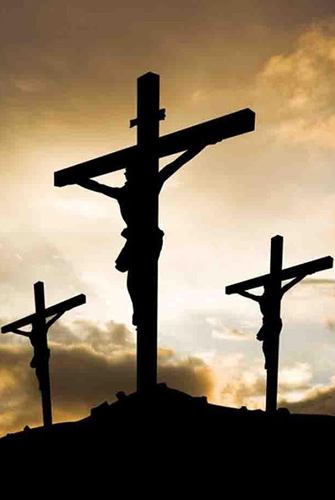
Jesus suffers a hate crime
Jesus’ crucifixion today might be considered a hate crime. Religious leaders hated him. He threatened their positions in society, challenged their hypocrisy and beliefs, did miracles they could not discredit and was popular with most people. They knew they had to get rid of him. Late at night, therefore, they hunted him down, arrested him, beat him, and put him through three illegal court trials.
Just before dawn, they convicted him of blasphemy for claiming to be God. Then they dragged him before the Roman governor of Judea, Pontius Pilate. Only the Roman government had the authority to carry out capital punishments.
However, when they presented their case before him, they couldn’t use any of their religious arguments. The Roman government didn’t care about religious disputes, so the Jewish leaders made it a civil matter. They accused Jesus of subverting the nation, opposing the payment of taxes (Luke 20:25), and calling himself a king (Luke 23:2). All of these charges were false, and the accusations did not stick. The Roman governor punished Jesus, but this did not satisfy the crowd of spectators. The religious leaders and many of the Jewish people cried out for Jesus’ crucifixion. “If you let this man go, you are no friend of Caesar. Anyone who claims to be a king opposes Caesar,” (John 19:12b, NIV). The chief priests shouted, “We have no king but Caesar” (John 19:15, NIV). Finally, because of political pressure by the Jewish leaders, Pilate turned Jesus over to Roman soldiers to be crucified. Learn more about the crucifixion here.
Eight Responses to Jesus’ crucifixion
- Mocking and Insults
The religious leaders deny he is the Christ, and they want the sign above his head changed from “The King of the Jews” to “This Man claimed to be the King of the Jews” (John 19:19-22). Then all who pass by him mock and insult him, and some shake their heads and say,
“You who are going to destroy the temple and build it in three days, save yourself! Come down from the cross, if you are the Son of God!” Those crucified with him also heaped insults on him (Mark 15:29-30,32 NIV)
In the same way the chief priests, the teachers of the law and the elders mocked him.“He saved others,” they said, “but he can’t save himself! He’s the King of Israel! Let him come down now from the cross, and we will believe in him. He trusts in God. Let God rescue him now if he wants him, for he said, ‘I am the Son of God.’” (Matthew 27:39-43, NIV)
One of the criminals who hung there hurled insults at him: “Aren’t you the Christ? Save yourself and us!” (Luke 23:39, NIV)
- Forgiveness
How does Jesus respond to their mocking? Does he rail back at them, or call fire down upon them? No, the Son of God says, “Father forgive them for they know not what they do” (Luke 23:34, NIV). Instead of Jesus calling curses upon his enemies, he prays that God will forgive them!
Many people today also insult, mock, and use Jesus’ name in vain. He died on the cross and now offers forgiveness for all who trust him for salvation (John 3:16-17; John 5:24). Christians, if Jesus could forgive his enemies who crucified him, we need to forgive those who hurt us. 3. Guilt and Believing
- Guilt and Believing
After a time on the cross, the heart of one of the thieves crucified beside Jesus softens (Luke 23:39-43). He acknowledges he is guilty of his crimes, fears God, and comes to believe in Jesus as the King and Savior of souls. The thief asks Jesus to remember him when he comes into his kingdom. Jesus’ silent testimony and his words of genuine forgiveness, amid intense suffering, profoundly impacts the criminal.
Like the thief on the cross, the good news is that if we turn from our sin and believe in Jesus’ sacrifice for us, we can receive forgiveness and have the assurance of going to heaven (more…).
Christians, do others see that we do not curse God or man when we are suffering but endure it and are forgiving toward our enemies?
- Greed and Selfishness
The soldiers gamble over Jesus’ clothing to see who might win them (John 19:23-24). Some people are like vultures in their greed and selfishness when others die. Even today, some make merchandise from the cross of Christ. How does Jesus respond?
- Caring
Jesus doesn’t curse God because of his pain and agony, or his feeling of being forsaken by his heavenly Father, or the injustice of his circumstances. No, he cares for others, especially those closest to him. From the cross, Jesus tells John, his closest friend on earth, “Take care of my mother” (John 19:26-27). His mother, Mary, will soon need comfort, and he knows John will take good care of her.
If we knew we were going to suffer quickly and die, if possible, we should follow Jesus’ example and try to provide for our loved ones. (Hebrews 10:19-20).
- Exclamations
When the Son of God dies, there is thick darkness in the middle of the day, a terrible earthquake, and God splits open the temple’s veil from top to bottom.
When the centurion and those with him who were guarding Jesus saw the earthquake and all that had happened, they were terrified, and exclaimed, ‘Surely he was the Son of God!’” (Matthew 27:54, NIV).
Do we fear God when we hear of the crucifixion of Christ? Do we see God involved in nature and the lives of people? Let’s fear him and give him praise!
- Grief and Sobriety
The crowd watches the terrible scene, they beat their breasts (a sign of mourning), and then they go home. Perhaps in this crowd are many people he has healed, given sight, hearing, or speech, raised to life, miraculously fed, and taught. They are sad, but there is nothing they can do about it, and they go home.
Sadness is still the response many have at Communion Services, where we remember the suffering and death of Christ on our behalf. Thinking soberly, in light of his crucifixion for us, how should we then live?
- Disillusion and Shock
The family members, friends, and close followers of Jesus remain at the scene of the cross for a while after he dies, and they watch what will happen next (Luke 23:49). His followers were so sure this was their Messiah. He was supposed to deliver them from oppression and Roman rule, give their nation peace and prominence, and reign as their king as the ancient prophets foretold. Now he is dead. They watch Jesus being taken down from the cross and buried before they go home. They are in shock.
Our Response
What response do we have to the death of Christ? When we think about it, does it just make us sad, and then we go on with our life? Are we in shock and grief from all that we learn about Jesus’ sufferings?
Thinking about the death of Christ is indeed sad, but today we call it, “Good Friday.” On this day, we rejoice that he purchased our salvation by his death on the cross. His death is not the end of the story—Jesus would not stay dead in the tomb! As an old preacher once said, “Today is Friday, but Sunday is a-comin’!”
Helpful resource: Why the Resurrection is Important by Chip Ingram.
Discussion
If we are falsely accused and have to suffer for it, how should we respond?
What are some responses we have to the death of Christ? What answers might change our lives?
What does Galatians 2:20 mean, and how should it be expressed?
Focus Verse
Galatians 2:20 (NIV) “I have been crucified with Christ and I no longer live, but Christ lives in me. The life I live in the body, I live by faith in the Son of God, who loved me and gave himself for me.”
Watch a dramatized version of the crucifixion, burial, and resurrection of Christ
Endnote: The way the Jewish people count the days is that any part of a day is one day. On Friday, Jesus died before sundown. On Saturday, his body lay in the tomb, On Sunday, just after sunrise, he arose from the grave. This was the third day.
Crucifixion—What is it?
The Bible Knowledge Commentary describes the crucifixion of Jesus, which we witness in today’s Bible reading. This is a summary of it.
Crucifixion remains one of the cruelest forms of capital punishment ever devised. The Roman government only crucifies those who are considered the worst of criminals. Pilate tried to deliver Jesus from this fate—he knew the religious leaders only wanted him killed because they were jealous of him. But Pilate caved to pressure from the crowd.
Those sentenced to die by crucifixion carry a 100-pound cross beam on which they will be impaled. Jesus is so weak from the previous night’s mocking, whipping, and beatings that the soldiers get Simon of Cyrene to bear his cross part of the way.
At the top of the crucifix, the soldiers nail a sign listing the crimes of the criminals. In the case of Jesus, the sign reads, “This is Jesus of Nazareth, King of the Jews.” Crucifixion is an example to others of the penalty for rebellion against the Roman government. The irony is that Jesus is innocent of any wrong, and yet the sign is correct, for he is the King of the Jews.
The site of the crucifixion is Golgotha, a rocky hill that resembles a giant skull. When the criminals arrive, they offer them wine to dull the senses and ease the pain they will bear, but Jesus refuses it. Then, the criminals’ arms and legs are stretched out and held tight. They are then nailed to a rough-hewn wooden cross with long iron spikes into their hands and feet.
Through many long hours (and sometimes days), the criminals hanging on the cross are in agony. Each attempt to push up so they might fill their lungs with oxygen is excruciating. Finally, the condemned suffocate, not having the stamina to push themselves up anymore. If their deaths are not quick in coming, the legs are often broken to hasten their demise (Jesus dies after three hours of suffering, so they do not break his legs).
End notes:
1. or perhaps, the wrists and ankles, for they are considered part of the hands and feet and can bear the weight of the body
2, the soldiers already whipped Jesus—his back is a bloody, raw, painful mess, and this adds to his agony and loss of strength.
summary source: The Bible Knowledge Commentary of the N.T., edited by Walvoord and Zuck, © 1985, pp. 88-89, 188, and 262.
more Bible studies about Jesus


Pingback: 15 reasons to love these unique chronological Bible studies